牛津译林版 九年级上册 Unit 6 Period 1 Comic strip & Welcome to the unit课件(共13张PPT)
文档属性
| 名称 | 牛津译林版 九年级上册 Unit 6 Period 1 Comic strip & Welcome to the unit课件(共13张PPT) | 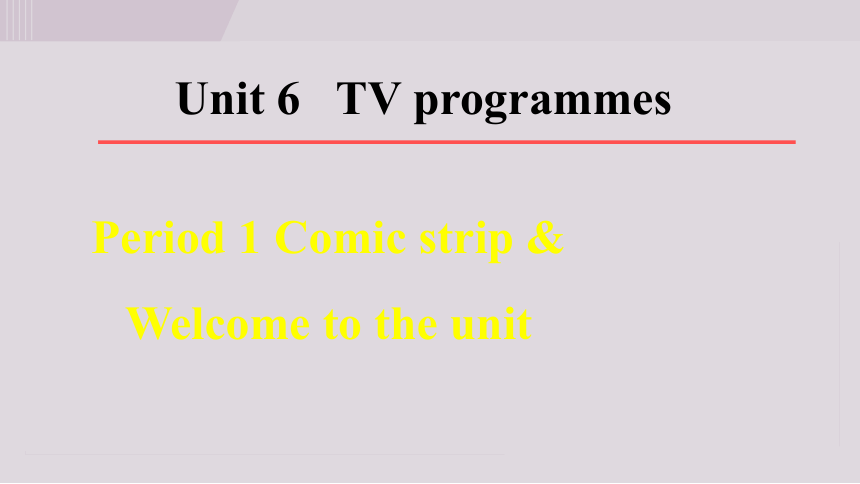 | |
| 格式 | pptx | ||
| 文件大小 | 926.2KB | ||
| 资源类型 | 教案 | ||
| 版本资源 | 牛津译林版 | ||
| 科目 | 英语 | ||
| 更新时间 | 2023-05-16 19:21:01 | ||
图片预览

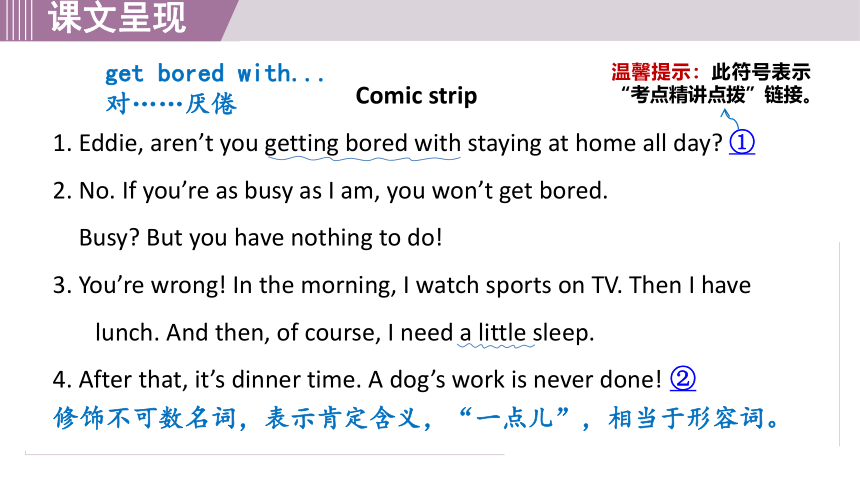
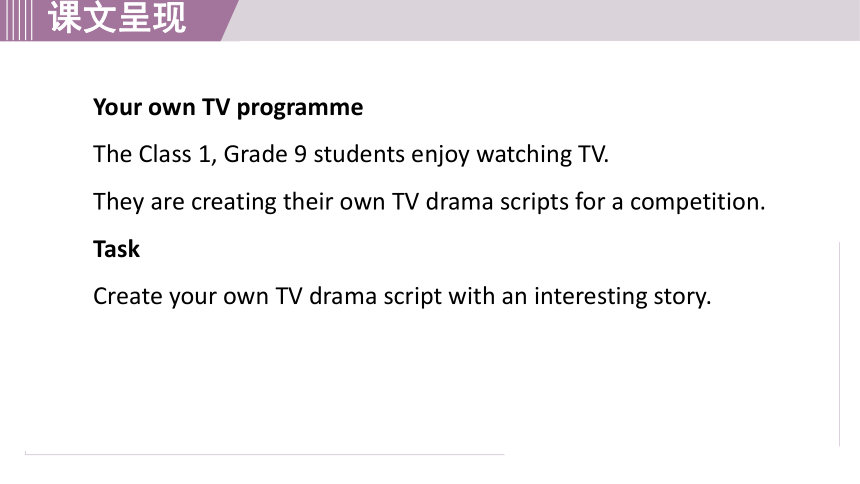
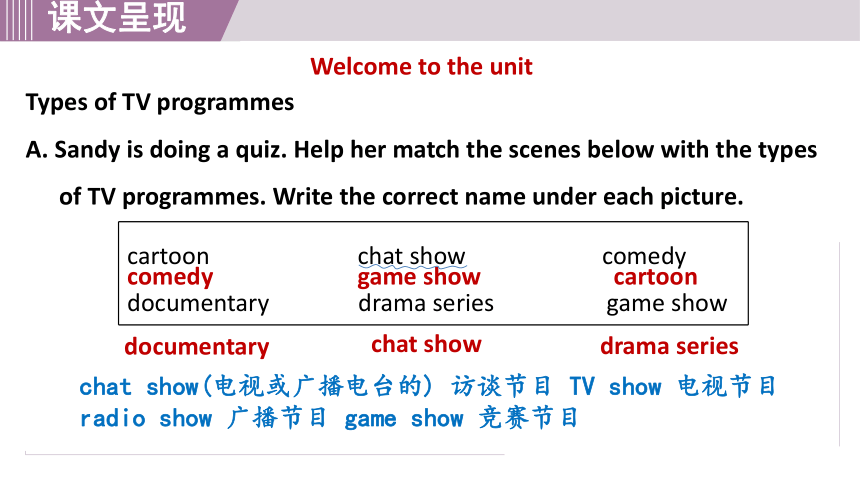
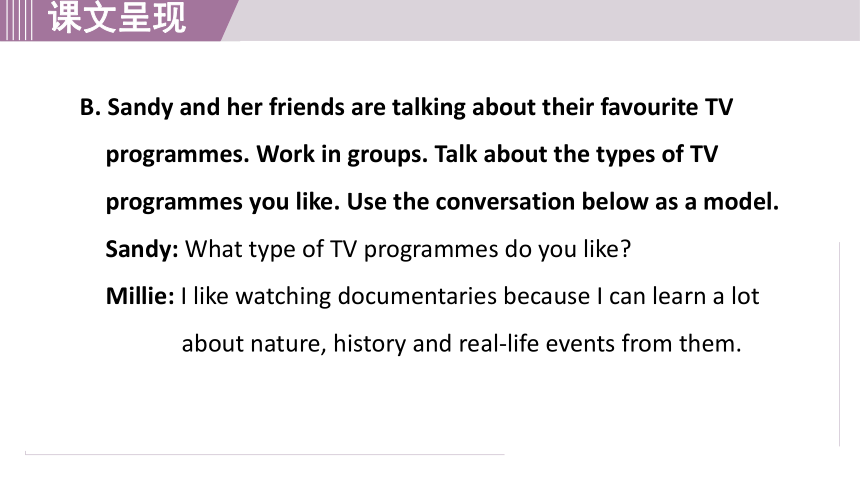
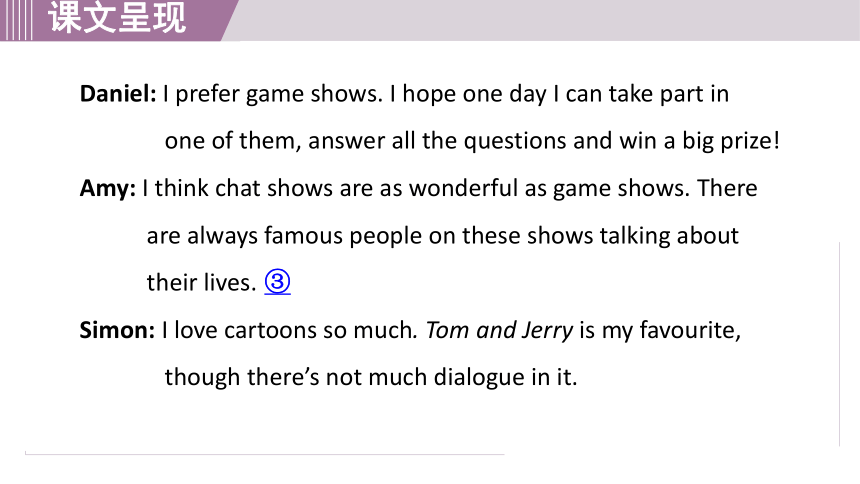
文档简介
(共13张PPT)
Period 1 Comic strip & Welcome to the unit
Unit 6 TV programmes
课文呈现
Comic strip
1. Eddie, aren’t you getting bored with staying at home all day ①
2. No. If you’re as busy as I am, you won’t get bored.
Busy But you have nothing to do!
3. You’re wrong! In the morning, I watch sports on TV. Then I have lunch. And then, of course, I need a little sleep.
4. After that, it’s dinner time. A dog’s work is never done! ②
温馨提示:此符号表示“考点精讲点拨”链接。
get bored with...
对……厌倦
修饰不可数名词,表示肯定含义,“一点儿”,相当于形容词。
课文呈现
Your own TV programme
The Class 1, Grade 9 students enjoy watching TV.
They are creating their own TV drama scripts for a competition.
Task
Create your own TV drama script with an interesting story.
课文呈现
Types of TV programmes
A. Sandy is doing a quiz. Help her match the scenes below with the types of TV programmes. Write the correct name under each picture.
Welcome to the unit
cartoon chat show comedy
documentary drama series game show
comedy
game show
cartoon
documentary
chat show
drama series
chat show(电视或广播电台的) 访谈节目 TV show 电视节目 radio show 广播节目 game show 竞赛节目
课文呈现
B. Sandy and her friends are talking about their favourite TV programmes. Work in groups. Talk about the types of TV programmes you like. Use the conversation below as a model.
Sandy: What type of TV programmes do you like
Millie: I like watching documentaries because I can learn a lot about nature, history and real-life events from them.
课文呈现
Daniel: I prefer game shows. I hope one day I can take part in one of them, answer all the questions and win a big prize!
Amy: I think chat shows are as wonderful as game shows. There are always famous people on these shows talking about their lives. ③
Simon: I love cartoons so much. Tom and Jerry is my favourite, though there’s not much dialogue in it.
①Eddie, aren’t you getting bored with staying at home all day
否定疑问句
否定疑问句是一般疑问句的否定形式。其结构是:把助动词、情态动词等放在主语之前,把not 放在主语之后。
e.g. Can you not see 难道你没看见吗?
Don’t you know the twins’ names
难道你不知道双胞胎的名字吗?
考点1
考向1
否定疑问句常常用来表示惊奇、责备、建议等,常译为“难道…… ”
回答否定疑问句时,答语中用yes 或no 应该以答语的内容是肯定或否定为准。也就是说:答语的内容是肯定的就用yes;答语的内容是否定的就用no。即:Yes后一定是肯定句;No 后面一定是否定句。
e.g. —Doesn’t he want to go 他难道不想去吗?
—Yes, he does. 不,他想去。
/ No, he doesn’t. 是,他不想去。
考向2
但一般总是使用简略式Can’t you see 即把don’t, can’t等放在句首。
yes通常译为“不”,no通常译为“是的”。
考题1:[天水] —Don’t you go to school by bike
—______. I walk to school every day.
A. Yes, I don’t B. No, I do
C. Yes, I do D. No, I don’t
D
【点拨】本题用语法判定法。事实上是肯定的用yes 回答,事实上是否定的用no 回答。根据答语可知,我不是骑自行车上学而是步行。
返回
温馨提示:可返回原文
②A dog’s work is never done!
done /d n/ adj. 完毕,结束
e.g. When you’re done, perhaps I can say something.
等你说完,也许我可以说点什么。
I’ll be glad when this job is over and done with.
这个工作彻底完成后我就高兴了。
考点2
作形容词,在句中作表语。
返回
③There are always famous people on these shows talking about their lives.
There be +主语+ doing sth. 有某人在做某事。
e.g. There are some girls dancing in the room.
房间里有一些女孩在跳舞。
There is a boy crying in the street.
有一个男孩在街上哭。
There is a lot of housework to do today.
今天有许多家务活要做。
考点3
There be...+ 动词不定式,
意为“有……要做”。
考题2:[铜仁] —Look! There are some students ______ basketball on the playground.
—Yes. I often see them ______ basketball there.
A. play; play B. play; playing
C. playing; play D. playing; playing
C
返回
本节课主要学习了:
重点单词:done , real-life, dialogue
重点短语:chat show, game show, have nothing to do, type of TV programmes, real-life events, win a big prize
Period 1 Comic strip & Welcome to the unit
Unit 6 TV programmes
课文呈现
Comic strip
1. Eddie, aren’t you getting bored with staying at home all day ①
2. No. If you’re as busy as I am, you won’t get bored.
Busy But you have nothing to do!
3. You’re wrong! In the morning, I watch sports on TV. Then I have lunch. And then, of course, I need a little sleep.
4. After that, it’s dinner time. A dog’s work is never done! ②
温馨提示:此符号表示“考点精讲点拨”链接。
get bored with...
对……厌倦
修饰不可数名词,表示肯定含义,“一点儿”,相当于形容词。
课文呈现
Your own TV programme
The Class 1, Grade 9 students enjoy watching TV.
They are creating their own TV drama scripts for a competition.
Task
Create your own TV drama script with an interesting story.
课文呈现
Types of TV programmes
A. Sandy is doing a quiz. Help her match the scenes below with the types of TV programmes. Write the correct name under each picture.
Welcome to the unit
cartoon chat show comedy
documentary drama series game show
comedy
game show
cartoon
documentary
chat show
drama series
chat show(电视或广播电台的) 访谈节目 TV show 电视节目 radio show 广播节目 game show 竞赛节目
课文呈现
B. Sandy and her friends are talking about their favourite TV programmes. Work in groups. Talk about the types of TV programmes you like. Use the conversation below as a model.
Sandy: What type of TV programmes do you like
Millie: I like watching documentaries because I can learn a lot about nature, history and real-life events from them.
课文呈现
Daniel: I prefer game shows. I hope one day I can take part in one of them, answer all the questions and win a big prize!
Amy: I think chat shows are as wonderful as game shows. There are always famous people on these shows talking about their lives. ③
Simon: I love cartoons so much. Tom and Jerry is my favourite, though there’s not much dialogue in it.
①Eddie, aren’t you getting bored with staying at home all day
否定疑问句
否定疑问句是一般疑问句的否定形式。其结构是:把助动词、情态动词等放在主语之前,把not 放在主语之后。
e.g. Can you not see 难道你没看见吗?
Don’t you know the twins’ names
难道你不知道双胞胎的名字吗?
考点1
考向1
否定疑问句常常用来表示惊奇、责备、建议等,常译为“难道…… ”
回答否定疑问句时,答语中用yes 或no 应该以答语的内容是肯定或否定为准。也就是说:答语的内容是肯定的就用yes;答语的内容是否定的就用no。即:Yes后一定是肯定句;No 后面一定是否定句。
e.g. —Doesn’t he want to go 他难道不想去吗?
—Yes, he does. 不,他想去。
/ No, he doesn’t. 是,他不想去。
考向2
但一般总是使用简略式Can’t you see 即把don’t, can’t等放在句首。
yes通常译为“不”,no通常译为“是的”。
考题1:[天水] —Don’t you go to school by bike
—______. I walk to school every day.
A. Yes, I don’t B. No, I do
C. Yes, I do D. No, I don’t
D
【点拨】本题用语法判定法。事实上是肯定的用yes 回答,事实上是否定的用no 回答。根据答语可知,我不是骑自行车上学而是步行。
返回
温馨提示:可返回原文
②A dog’s work is never done!
done /d n/ adj. 完毕,结束
e.g. When you’re done, perhaps I can say something.
等你说完,也许我可以说点什么。
I’ll be glad when this job is over and done with.
这个工作彻底完成后我就高兴了。
考点2
作形容词,在句中作表语。
返回
③There are always famous people on these shows talking about their lives.
There be +主语+ doing sth. 有某人在做某事。
e.g. There are some girls dancing in the room.
房间里有一些女孩在跳舞。
There is a boy crying in the street.
有一个男孩在街上哭。
There is a lot of housework to do today.
今天有许多家务活要做。
考点3
There be...+ 动词不定式,
意为“有……要做”。
考题2:[铜仁] —Look! There are some students ______ basketball on the playground.
—Yes. I often see them ______ basketball there.
A. play; play B. play; playing
C. playing; play D. playing; playing
C
返回
本节课主要学习了:
重点单词:done , real-life, dialogue
重点短语:chat show, game show, have nothing to do, type of TV programmes, real-life events, win a big prize
